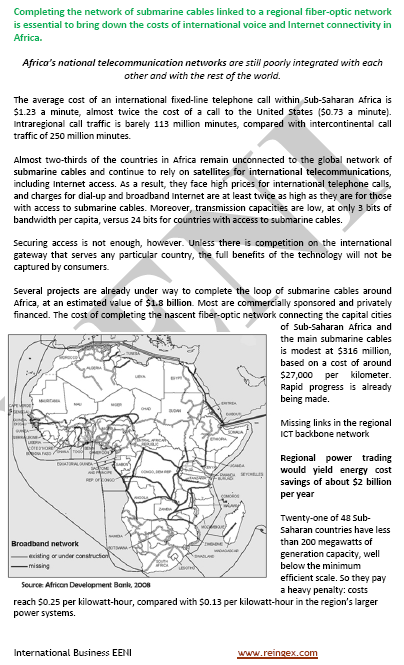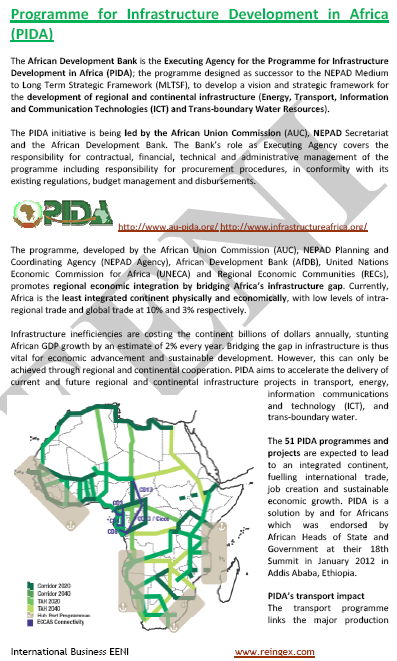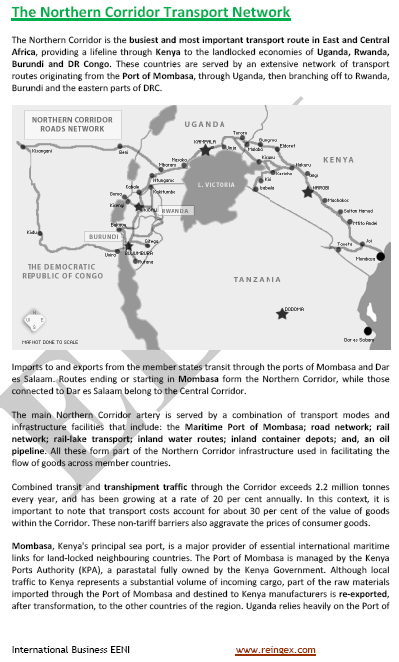Infrastructures in Africa. Regional Integration
Programme for Infrastructure Development in Africa. African mobile revolution
Infrastructure has been a significant driver of the strong economic growth in African economies in the last years. international transport sector in Africa requires 18 billion dollars in annual investment, 50% for operations and maintenance.
- The largest countries that are financing infrastructures in Africa are China (13.4 billion dollars), Brazil, India, and South Korea
- The most attractive African Countries for investment in infrastructures are South Africa, Kenya, Ghana, Mozambique, Tanzania, Botswana, Uganda, Angola, Namibia, and Zambia

The Subject “Infrastructures in Africa. Programme for Infrastructure Development in Africa” consists of two parts:
1- Infrastructures in Africa.- African Infrastructure Knowledge Programme
- Infrastructure Consortium for Africa
- Trends in Infrastructure Investments in Africa
- Analysis of infrastructure in Africa
- Infrastructure and economic growth in Africa
- Infrastructure and poverty reduction
- African institutional framework for infrastructure
- Urbanization and delivery of infrastructure services
- African Regional Integration and infrastructures
- Information and communication technology (ICT) in Africa
- Spectacular growth in CT access
- African mobile revolution
- ICT and integration in Africa
- Irrigation
- Power
- Sanitation
- Water Resources and Supply
- Introduction to Transport and Logistics in Africa (*)
(* Analyzed in another module).
2- Programme for Infrastructure Development in Africa (PIDA).
- Introduction to the Programme for Infrastructure Development in Africa (PIDA)
- Key sectors of the PIDA
- Energy
- Transport and Logistics
- Information and communications technology (ICT)
- Transboundary Water Resources
- PIDA outcomes: development through regional integration
- Costs and investments of the Programme for Infrastructure Development in Africa
- Single African Air Transport Market (SAATM / IATA)
Infrastructures in Africa. Programme for
Infrastructure Development in Africa


The Subject “Infrastructures in Africa. Programme for Infrastructure Development in Africa” is included within the curriculum of the following academic programs at EENI Global Business School:

Master in Business in Africa, Transport and Logistics in Africa.
Doctorate in African Business, Global Logistics.
Languages:  or
or  Infrastructures en Afrique
Infrastructures en Afrique
 Infraestruturas na África
Infraestruturas na África  Infraestructuras en África.
Infraestructuras en África.
- Substantial investments in information and communications technology and infrastructures will be made to meet the market demand for telecommunications services in twenty-four countries of Sub-Saharan Africa
- Africa has benefited from some significant optimizations in infrastructure
- 50% of the African population lives in range of a GSM mobile phone signal
- Five African Countries have already met the UN Millennium Goals for universal water access, and twelve others are on-track to do so, 80% of the African main road network is in good or fair condition
- Only 33% of rural Africans has access to an all-season Roads, 20% of the population in Cameroon, Ghana, Mauritania, Niger, and Tanzania must travel 2 kilometers to their main water supply
- African Consumers should pay double as much for basic services as people elsewhere in the World, a monthly basket of prepaid mobile telephone services costs 12 USD in Africa but only 2 USD in South Asia
- Chronic power shortages plague thirty African Countries, only 25% of Africans have access to electricity. The entire installed generation capacity of forty-eight Sub-Saharan African Countries is 68 gigawatts
- enterprises in many African Countries indicate that biggest Technical Barriers to do business is power constraint. Outside of South Africa, power consumption is barely 1% of the level in high-income countries
The four pillar of the Programme for Infrastructure Development in Africa (PIDA) are:
- Energy
- Transport
- Information and Communication Technologies
- Transboundary Water Resources
The Programme for Infrastructure Development in Africa (PIDA) is executed by the African Development Bank, and lead by the African Union and AUDA-NEPAD.

Trans-African corridors:
- Trans-African Road Network
- Lobito
- Northern Logistics Corridor
- Algiers-Lagos
- Cairo-Dakar
- Asia-Africa Logistics Corridor
Sample:
(c) EENI Global Business School (1995-2025)
Top of this page











 WhatsApp
WhatsApp